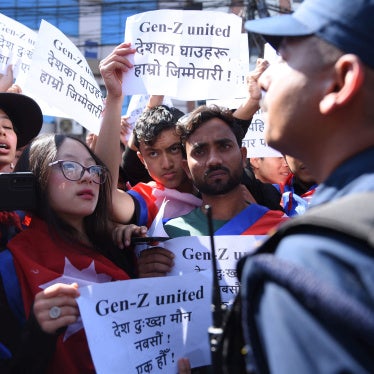(Washington, DC) - Respect for human rights has been seriously eroded over the past year in several Asian countries, in particular Nepal, Cambodia, Thailand, Bangladesh, Sri Lanka and China, Human Rights Watch said today as it issued its World Report 2006.
“Impunity from prosecution for human rights violations is the most important problem in the region, and the most widespread,” said Brad Adams, Asia division director at Human Rights Watch. “The ‘Asian values’ argument that human rights are different in Asia has been defeated. But the abusive governments that used to hide behind that rhetoric still commit the worst kinds of abuses without fear of punishment.”
Human Rights Watch pointed out that China and Vietnam continued to actively censor the internet, restrict religious freedom and severely restrict freedom of expression. Pakistan, India, Nepal and southern Thailand violated human rights in efforts to crush rebellions and insurgencies, while an increasingly violent insurgency in Afghanistan hampered desperately needed development efforts.
Women and girls in much of the region, particularly in Afghanistan, Pakistan, Nepal, India and Bangladesh, continued to suffer from discrimination and violence. Female domestic workers in Singapore and Malaysia confronted a range of abuses and at times situations of forced labor and trafficking.
The tsunami and Kashmir earthquake caused massive destruction and hardship in Indonesia, Sri Lanka, India, and Pakistan. While strong efforts were made to help victims, women displaced by the tsunami and the earthquake were often not recognized as heads of households when land and shelter were allocated.
Afghanistan
Afghanistan faced an increasingly violent insurgency in southern and southeastern areas, while elsewhere warlords were stronger. Women and girls continue to suffer from discrimination, restrictions and targeted violence.
Bangladesh
Political and security conditions deteriorated in 2005, with bombings throughout the year. Security forces continued to commit abuses, including extrajudicial killings, while human rights defenders and journalists who reported abuses were harassed and intimidated.
Burma
Burma continued to drastically restrict basic rights and freedoms, keeping Aung San Suu Kyi isolated under house arrest, and with hundreds of thousands of ethnic minorities living precariously as internally displaced people.
Cambodia
Prime Minister Hun Sen moved to silence dissent in 2005, targeting political parties, independent media and civil society, culminating in December with the conviction of opposition party leader Sam Rainsy and the arrest of human rights activists.
China
Amidst growing unrest stemming from uneven economic growth and forced evictions, China cracked down forcefully and sometimes violently on protestors. Severe restrictions on freedom of expression and association continued with special targeting of journalists and those using the internet to share information.
East Timor
East Timor’s United Nations-established tribunal to investigate and prosecute serious crimes by Indonesian military and militia shut down due to lack of international support.
India
Militant groups and Indian security forces continued in attacks on civilians. Caste-based violence continued, especially in rural areas, and tribal groups that had converted to Christianity were targeted for attack by extremist Hindu organizations.
Indonesia
Indonesia worked on rebuilding Aceh after the December 2004 tsunami. The August 2005 peace agreement with the Free Aceh Movement was a positive step. Despite a US waiver of human rights-related restrictions on military assistance, the Indonesian military continued to violate human rights with impunity.
Malaysia
Malaysia continued to use the Internal Security Act and the Emergency Ordinance to detain persons indefinitely without charge or trial.
Nepal
King Gyanendra’s February 1 coup led to severe abuses and a widespread denial of civil and political rights. The army continued to operate with almost complete impunity. Maoist atrocities against civilians continued, though the situation improved after a unilateral Maoist ceasefire for the last three months of the year.
North Korea
North Korea continued to restrict almost all basic rights, with arbitrary arrests, pervasive use of torture, and virtually no freedom of expression, association, assembly, information or freedom of religion. In September, North Korea asked the World Food Program and most residing Western aid organizations to end relief operations, including food aid, which could lead to more hunger for the vulnerable population.
Papua New Guinea
Papua New Guinea police routinely used violence and torture against individuals in custody, with children as frequent targets. Police abuses, such as police rape, targeting of sex workers and men and boys engaged in homosexual conduct and harassment of people carrying condoms, may also fuel Papua New Guinea's burgeoning AIDS epidemic. Violence against women and girls were pervasive, with police often ignoring complaints of sexual or domestic violence.
Pakistan
President Musharraf continued to tighten his grip on power and did little to address legal discrimination against women, mistreatment of religious minorities, arbitrary detention of political opponents, harassment of the media or abuses related to the war on terror.
Sri Lanka
The December 2004 tsunami devastated much of coastal Sri Lanka, especially areas already affected by the civil war. Sectarian conflicts worsened after the tsunami with disputes over aid resources exacerbating existing tensions. The Tamil Tigers continued to assassinate political opponents with complete impunity.
Thailand
Insurgents and security forces engaged in widespread human rights violations in the south, including large numbers of killings. The government introduced draconian new security legislation. Restrictions on media freedom continued and Thailand continued to back Burma’s military junta.
Vietnam
Vietnam continued to restrict religious freedom, impose controls over the Internet and the press, restrict public gatherings and imprison people for their religious or political views.








